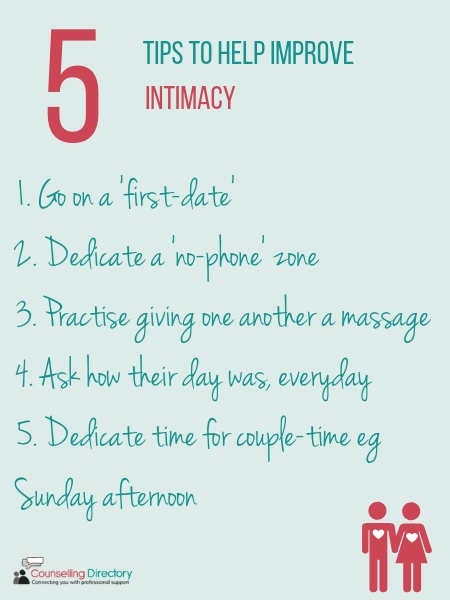Intimacy is defined as a close, familiar and unique bond existing between humans, both physically and emotionally. A strong relationship survives on both forms of intimacy that has grown and evolved over time, thriving on a slow release of trust and self-disclosure.
As a basic need, we require love and affection, both in spoken word and in gentle touch, cuddles and hugs. A lack of intimacy can bring problems for a couple, particularly if it was once an important role in the relationship or if one partner is more intimate than the other.
Intimacy builds strong foundations for couples to survive through the toughest of times, an anchor for when the going gets tough and the constant reassurance that you aren’t alone. It’s the need to be as close as emotionally possible to the one person we’ve promised to spend the rest of our lives with.
Couples counselling can provide support during these very difficult times.
Physical and emotional intimacy
Physical and emotional intimacy go hand in hand: for a long standing relationship, you can’t create a physical connection without inducing emotional intimacy. Lacking emotional intimacy whilst the physical connection is thriving can develop complications with trust, anger, frustration and confusion for couples.
In a similar breath, possessing a fiercely unique emotional intimacy without having physical intimacy, is incredibly difficult to maintain a relationship that has both individual and collective needs.
- Emotional intimacy
If you know you can give your partner a ‘knowing’ look from across the room, and that they’ll respond with that special wink or smile, then you’ve developed an emotional intimacy in your relationship.
- Physical intimacy
It’s in a human being’s nature to require physical intimacy – this is why simple physical affection, such as hand-holding, cuddling, hugging and kissing is important to your relationship – alongside emotional understanding and capability.
“Communication is at the heart of sexual intimacy. In the early days of the relationship, lust can often carry you through, but over time, sexual relationships can change. In healthy relationships, although the level of passion may decrease, the emotional connection gets deeper and more fulfilling; partners who are able to talk openly feel no inhibitions about sharing any concerns and expressing their needs and responses.
However, some couples, especially those who have never really discussed their sexual behaviour, struggle to accept and embrace change and may harbour feelings of disappointment or loss. Rather than talking about issues which they find uncomfortable or embarrassing, they can get into a routine in which lovemaking is in danger of becoming a routine chore and thus less rewarding for one or both partners.”
– Jenny Oyston, Counsellor
What happens when one partner is more intimate?
It’s very common for one type of intimacy to be more important to one partner than the other or one partner more comfortable with intimacy. In this instance, couples often find themselves thinking all is well until one partner finally speaks up and lets them know that the intimacy levels are not what they should be. Or, even more tragic, neither partner says anything and they find themselves ending the relationship without really knowing the true cause.
If you can’t be intimate with your partner, whether physically or emotionally (or both), it will make having a lasting relationship with your partner difficult. The reason for this is quite simple: without the emotional and physical bond between mates, there’s nothing to hold onto when things get rough and both partners find themselves feeling as though they haven’t an anchor to keep them safe in the rocky ocean of life.
A lack of intimacy
Without intimacy, there isn’t the security in the relationship of knowing that the other person is there for you, or of knowing that they truly love you. Where intimacy is lacking, most partners don’t intend to hurt their significant other, or are even unaware of the lack of intimacy which is why a lacking relationship, whether emotionally or physically, doesn’t have a promising success rate.
This lack of intimacy can cause support, understanding, loneliness and anger issues between a couple.
Keeping intimacy important
A relationship can survive without intimacy, but it will become a real struggle for both partners as time goes on; neither partner will be happy or feel secure in the relationship. Without happiness and security, the basis of a relationship is complicated. Once intimacy is lost or if it never existed in the relationship, it takes a lot of determination and commitment to get intimacy back in the relationship, but it’s not impossible if both couples are committed.
To form a strong, long-lasting bond, intimacy is required to fulfil a human’s basic need: it’s what human beings crave in order to create a safe, loving and happy relationship, and intimacy is a key ingredient.
How to improve intimacy?
“To improve intimacy in your relationship, think of it as a living thing that changes throughout your life. As you mature, both you and your partner’s needs change, so be open to that and acknowledge it in your relationship.”
- Read more on Happiful from counsellor Graeme.
If you feel that intimacy is lacking in your relationship and you once had a strong bond, it’s important to try to be as open as possible and communicate with your partner. Intimacy is an important aspect of developing as a couple and you aren’t criticising your partner or their capabilities as a partner.


Recent Comments